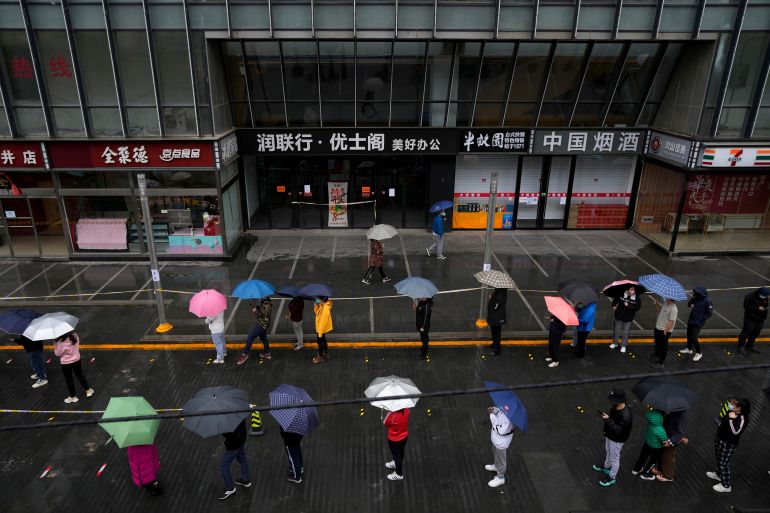Beijing imposes new transit restrictions in bid to contain COVID
As Omicron spreads, officials in China’s capital city are trying to avoid the kind of mass lockdown seen in Shanghai.

Authorities in China’s capital Beijing have shuttered the entrances to more than 40 subway stations and 158 bus routes, as the government tries to rein in the spread of the highly-contagious Omicron variant of the coronavirus.
The transit restrictions imposed on Wednesday affect districts on the eastern side of Beijing at the epicentre of its latest outbreak.
Keep reading
list of 3 itemsLockdown fears grow as Beijing orders mass COVID testing
China’s Shanghai reports first COVID deaths since lockdown
Starting from Thursday, a negative nucleic test issued within seven days will also be required to ride on public transport or enter public venues, state media also said, extending curbs that began during China’s week-long holiday centred around May 1.
Many cinemas, malls and gyms across the city have already closed their doors since late April while indoor dining is also banned. Schools also remain closed after the holiday ended, while a negative test result is required to enter places such as supermarkets.
Beijing has reported nearly 450 new cases since April 22 after testing 22 million people over three rounds of mass testing, according to state media.
The city is trying to avoid a Shanghai-style lockdown, which since the end of March has brought China’s most important economic centre to a standstill.
The lockdown in Shanghai also unleashed a wave of grievances against local authorities as residents were confined to their homes and struggled to secure enough food.
People in the city also reported that they were denied medical treatment at hospitals or restricted to quarantine facilities for days after passing a positive test as the government marshals its resources in pursuit of “zero COVID”.
For Beijing resident Richard Parsley, the capital’s tougher policies are not surprising after watching what happened in Shanghai.
“We have been advised not to go anywhere for months and months, so people are taking it pretty much in stride, it’s not as bad as Shanghai,” the Canadian told Al Jazeera.
Still, he said, many feared that a lockdown could be next. Many Beijing residents have bought additional freezers to store extra food, while he personally was stocking up on fresh water and other supplies.
Parsley said he has already taken five tests since the recent outbreak began as his apartment block requires additional tests.
Gonna be a commuting nightmare for many tomorrow morning when the holidays end.
Plus everyone will need to show proof of recent Covid test to use public transit.
Can only imagine the monster queues! https://t.co/pIuetPoAM9— 💙💛 RF Parsley (@sanverde) May 4, 2022
Some districts of Beijing have reportedly tried to calm the nerves of pet owners spooked by rumours by promising that at least one household member would be allowed to home isolate and take care of the pets if others were sent to a quarantine facility.
China’s internet has been captivated by reports on social media of health workers killing pets after their owners were taken into quarantine or animals otherwise left to starve at home.